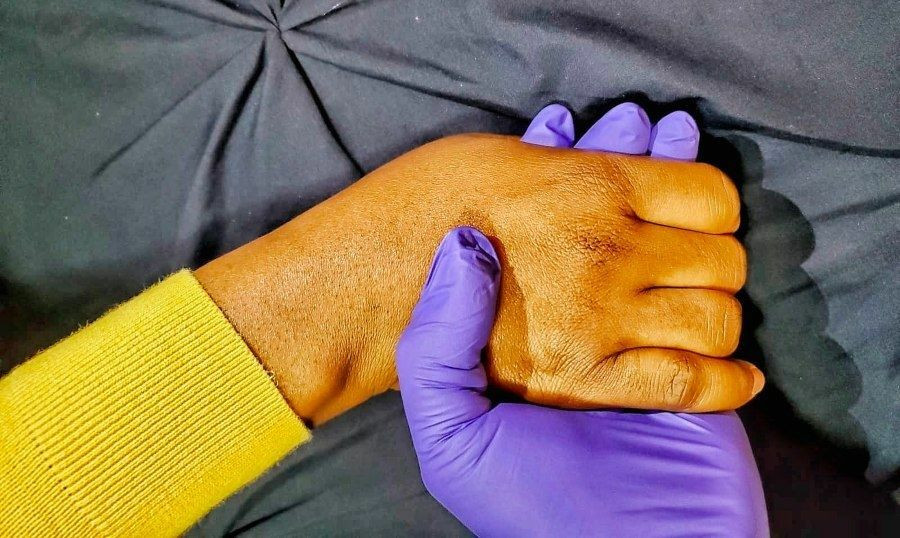Tosin* has been a long-term home care worker for about five years after migrating from Nigeria to Canada. She is a mother of two and has been comfortable with the job. All through the height of the COVID-19 pandemic, Tosin worked shifts at her nursing home while her kids stayed at home. With the reopening of schools, Tosin says she is glad they can finally get back to school. She is one of many who chose physical classes for her kids rather than virtual ones. For her, this is about convenience, but not only that. She feels it is important for the kids to return to school again after being holed up for so long indoors. She believes that staying home for almost six months has affected them, and wants them to be happy again. She feels her children will be fine if all schools follow the recommended safety precautions.
As a frontline worker, Tosin spent a lot of time educating her kids about COVID-19. Her children, 9 and six years old, were very worried in the beginning and scared about the pandemic. Now, she says they understand better and even take time to pray for her safety daily.
Fear on the LTC frontlines
The pandemic sent a ripple of uncertainty among long term care home workers. Fears peaked with the realization that senior citizens were highly vulnerable to the COVID-19 virus and less likely to recover. The death toll among senior citizens in Toronto was especially high. The Canadian Institute for Health Information, CIHI, assessment report revealed that 80 percent of deaths were of senior citizens in nursing and retirement homes. The hardest-hit homes lost up to 40 percent of residents within three months.
Tosin says, “It was really scary. I did not want to be the one that will bring it to my home”. At the close of work, she would spend a long time in a private room, before interacting with her kids. It wasn’t exactly sufficient isolation, but she just needed to feel like she had been properly sanitized before coming in contact with the children. Many caregivers began to withdraw their services. They were worried about getting infected.
One of those who took temporary time off is Ada, a mother of four who works in Toronto. Ada says when news of the high mortality rate came out, she could not bear the possibility of infecting her family and decided to take a break. She began to think about what would happen if she got infected. “I wondered, what do I do, my kids looked up to me and I didn’t have the answers. What have I kept in place for them?” Ada decided to process her life insurance around that time. She said she would stay home until the virus was contained reasonably, before resuming work again as a caregiver.
Seniors grateful for those who did not leave
Those who stayed on to work brought some relief to residents of nursing homes. Tosin says she became somewhat closer to the people she cared for, and “they were mostly happy that some of us did not quit”. She has learned a lot in caring for the seniors, and says she is determined to do whatever she can to make their lives easier. Now, her fears are reduced, as they have mastered the safety precautions, have sufficient protective equipment to keep them safe at work, and when they go home. They also get tested often. Tosin got a pay rise at work too.
CIHI assessments showed that nursing and retirement homes were already facing a deficit of staff, and any more reductions meant these homes would be hit with acute shortages in their workforce to provide much-needed aid for seniors and other people in need of care.
Ready for a new wave?
Recently, the numbers of COVID-19 infections have been rising in some provinces, and authorities are calling off the relaxation on lockdown. It is also reviving the risk and uncertainty faced by frontline health workers that had begun to elapse. Tosin says while they are better prepared now, the government should consider providing more incentives to healthcare aid workers to encourage them not to quit, and improve on pandemic education and sensitization programs, not only when there is an outbreak.
After re-opening earlier this month, infections are already being reported in schools, and for families like Tosin’s, who looked forward to when their kids will resume their normal lives, this poses a new challenge. Going back to school meant parents could have more time to work, and not worry about caring for kids left at home. But this may not work out the way they planned. For a brief moment, Tosin longs for the close extended family support system she left behind in Nigeria when she migrated that would have come in handy at this time.
But for now, she focuses on continuing her work as a health care aid worker, beating the pandemic, and making sure she makes the right choices for her kids.
Brenda Uji is a media professional in Toronto. She has worked in television and print media, covering a wide range of issues from security, to health, social development, and public policy.







